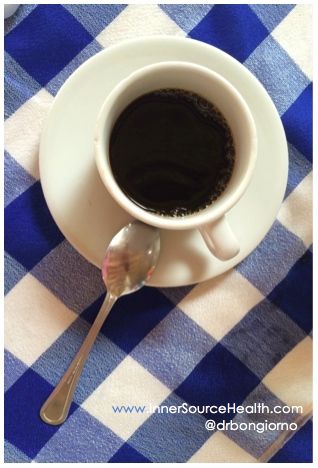
Anxiety
Can Coffee Help Anxiety?
Coffee can soothe anxiety in some cases.
Posted September 13, 2015 Reviewed by Ekua Hagan

" ... Coffee sets the blood in motion and stimulates the muscles; it accelerates the digestive processes, chases away sleep, and gives us the capacity to engage a little longer in the exercise of our intellects." - Honoré de Balzac
As the most well-used psychoactive drug of all time, coffee is an interesting compound, with generally positive reviews regarding health and mood. Regarding overall health, studies show some wonderful health effects for coffee.
Coffee can decrease a pre-diabetic’s risk for diabetes, lower incidence of bile tract and liver cancer, and even help prevent heart attacks after a meal. In fact, a 2013 review of the larger epidemiologic studies show regular coffee consumption to reduce mortality, both for all-cause and cardiovascular deaths. Brand new research by Guercio suggests it can help prevent the recurrence of colon cancer. In addition, coffee intake is associated with lower rates of heart failure, stroke, and diabetes.
Coffee to Help Anxiety?
Conventional wisdom suggests that caffeine-containing drinks are considered a “no-no” when it comes to anxiety. There’s good reason for this and many people with anxiety should avoid coffee. But, some of you reading this may benefit from coffee. Let’s review the information about coffee in terms of anxiety and mood to see what makes the most sense.
For some, the positive mood effects of coffee lie in caffeine’s ability to increase the senses of euphoria and energy, which I personally found it did for me years ago in my personal history with anxiety and panic attacks in my early 20s (I’m now 47). I found in certain situational anxiety I used to have, coffee actually made me less panicky. I didn’t know why. I just knew when I drank it, I felt less anxious and more happy.
Interestingly, it turns out there was a reason for that: Caffeine helps the brain release dopamine into the prefrontal cortex, a brain area important for mood regulation. Caffeine may also help the storage of dopamine in the amygdala, another part of the brain important for anxiety regulation.
In depression research, coffee is clearly helpful. In a 10-year cohort study of more than 50,000 older women, investigators found that compared with those who drank one cup or less of caffeinated coffee per week, those who drank two to three cups per day had a 15 percent decreased risk for depression, and those who drank four cups or more had a 20 percent decreased risk.
I know this may sound counterintuitive to many of you reading this, but for the right person, it may also help situational anxiety and panic attacks because it can raise levels of dopamine. Dopamine is the neurotransmitter of feeling in love for the first time. It is also important in feeling happy, motivated, and rewarded about something (versus scared).
Dopamine is typically low in people with depression as well as social anxiety (a type of situational anxiety). If you experience either of these, coffee every day, or before the situation of stress/panic, may make good sense for you. Of course, if you try coffee and find that it makes you feel worse and more panicky and anxious and/or you stop sleeping, then it is not the right beverage for your mood and situation.
Remember — Too Much Caffeine Is Still Too Much
Please note though, there is a threshold to coffee’s benefit — even for those for whom it is helpful. A study from Finland found that although the risk for suicide decreased progressively for those consuming up to seven cups of coffee per day (which is already too much for most anxious people), the risk started increasing when consumption went over eight cups a day. Also noteworthy in this study is that decaffeinated coffee, caffeinated tea, and chocolate did not have positive effects.
So, we need to remember that even when used for social anxiety and depression, long-term coffee use will still contribute to “burnout” in people who are already depleted and deficient. Caffeine is a mood-boosting substance, but too much, even for people who can tolerate it, will turn things very bad mood-wise.
There can be other negative health effects: Caffeine at long-term high doses can encourage mineral loss like magnesium, which is an important co-factor for brain neurotransmitters. Coffee may also contribute to fluctuations in blood sugar, which can raise anxiety levels. I have learned with my patients, if he or she is too depleted, and takes in too much coffee, they will burn out even more.
As you probably already know, caffeine-sensitive individuals may experience more insomnia. As we learned earlier, poor sleep will promote both anxiety and depression in predisposed individuals. If a patient is not sleeping, I will recommend they stop coffee until the sleeping issue is solved.
How Much Coffee Is Okay, Then?
As far as dosing coffee, I find for most people who do well with coffee, two cups a day, sipped slowly works well. More tends to make people who tend to anxiety become anxious and experience heart palpitations.
Oh, one more note — it is probably healthiest to skip all sugar. And if you are sensitive to dairy, switch to a natural non-dairy creamer or better milk (see my article on milk). Some of my patients do find adding a little fat like butter or dairy/non-dairy creamer also slows the "hit" of the caffeine, creating a more balanced boost to mood.
Conclusion
Again, whether coffee is best for you really depends on your particular situation. As I discuss in my book Put Anxiety Behind You, it is most important to lay down a healthy foundation to truly work through anxiety. Main ways to do this are:
- Psychotherapy/thought work
- Good sleep
- Blood sugar balancing
- Exercise
- Healthy eating and good digestion
- Proper nutrient and supplement intake
But what I've learned with myself, and some select patients with certain types of panic attacks and situational anxiety related to lower dopamine, coffee may be more helpful than not.
Peter Bongiorno, ND, LAc, is President of the New York Association of Naturopathic Physicians and is in private practice in New York.
References
Guercio BJ et al. Coffee Intake, Recurrence, and Mortality in Stage III Colon Cancer: Results From CALGB 89803 (Alliance). J Clin Oncol. 2015 Aug 17.
Bhatti SK, O'Keefe JH, Lavie CJ. Coffee and tea: perks for health and longevity? Curr Opin Clin Nutr Metab Care. 2013 Nov;16(6):688-97.
Lucas M, Mirzaei F, Pan A, Okereke OI, Willett WC, O'Reilly ÉJ, Koenen K, Ascherio A. Coffee, caffeine, and risk of depression among women.Arch Intern Med. 2011 Sep 26;171(17):1571-8.
Tanskanen A, Tuomilehto J, Viinamäki H, Vartiainen E, Lehtonen J, Puska P.Heavy coffee drinking and the risk of suicide. Eur J Epidemiol. 2000;16(9):789-91.



